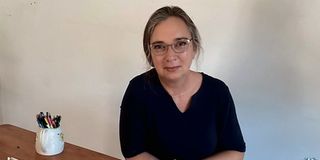Making women’s voices heard in the media

Kathy Magrobi, founder of 'Quote This Woman'.
What you need to know:
- A former media strategist, Ms Magrobi founded the South African non-profit company Quote this Woman in 2019, to create an online database of credible women experts.
- The database now boasts more than 350 women thought-leaders, experts and activists readily available for the call and more than 470 journalists as subscribers.
Because women's voices were quoted so seldom in the media, I had thought there was going to be a huge amount of resistance from journalists. And in fact, it was exactly the opposite,” says Kathy Magrobi.
A 50-year-old former media strategist, Ms Magrobi founded the South African non-profit company Quote this Woman in 2019, to create an online database of credible women experts — researchers, chief executives, heads of departments — that would be made available to newsrooms for free.
The aim, to close the media’s gender representation gap and make the news really represent the actual South African demographics.
The database now boasts more than 350 women thought-leaders, experts and activists readily available for the call and more than 470 journalists as subscribers.
Women experts are out there, as evidenced by Quote this Woman’s extensive database, but they are still massively under-represented in the media.
Last year, Johannesburg-based NGO Media Monitoring Africa, published a report on the media coverage of the Covid-19 pandemic in South Africa, which found that women only represented 21 per cent of all sources quoted.
Substantial bias
Another report, commissioned by the Bill & Melinda Gates Foundation to examine women’s representation in Covid-19 news coverage found a “substantial bias towards men’s perspectives” after analysing media coverage in South Africa, India, Kenya, Nigeria, the United Kingdom and the United States.
According to the research, women only represented 19 per cent of all experts quoted in the 175 highest ranked Covid-19-related articles across the six countries.
The research showed that women were nearly five times less likely to be featured as protagonists in US news coverage than men, nearly four times less likely in South Africa and Nigeria, three times less likely in India and Kenya and nearly three times less likely in the UK.
“When women’s voices aren’t being heard equally to men in the media, we almost know for sure that they are also not being heard equally at the tables where decisions are made. This means that the absolutely crucial expertise that exists within half of the population is not being leveraged.”
The under-representation of women in the media is the result of a number of factors, including structural inequality and internal bias, Ms Magrobi says.
Women experts
Quote this Woman also openly lobbies the media to have a more gender-balanced coverage, and coaches the women experts featured on the database, pointing out to them that their perspectives are crucial.
However, Covid-19 has dealt a blow to the already scarce resources of the company. Quote this Woman has not managed to secure additional funding, passed their initially awarded South African Media Initiative Programme grant, and currently runs on donations from experts and academics who believe in the project, and help from seven volunteers.
“It's just been absolutely heart-breaking to think that the project might not survive simply because the funding environment is so dire,” Ms Magrobi says.
Even though the Covid-19 pandemic has had such a devastating impact on finances, the non-profit’s founder is thankful journalists have been able to access the database during the heights of the health crisis.
This article is being published as part of “Towards Equality”, an international and collaborative initiative gathering 15 international news outlets to highlight the challenges and solutions to reach gender equality.





